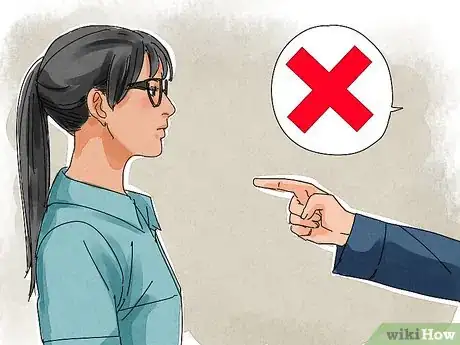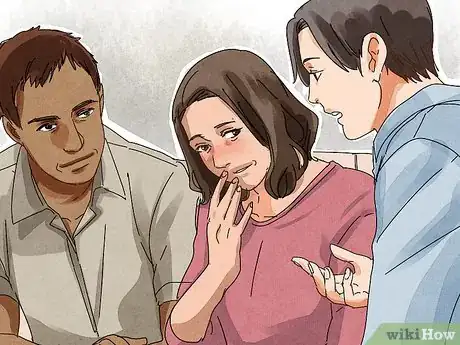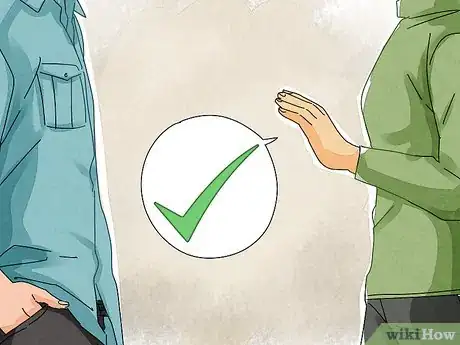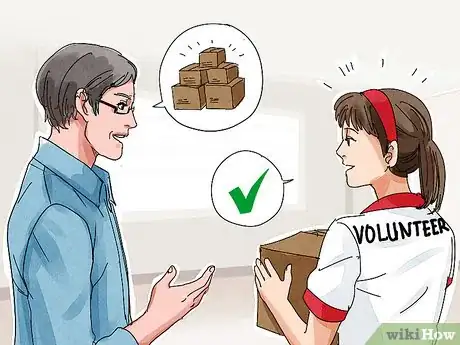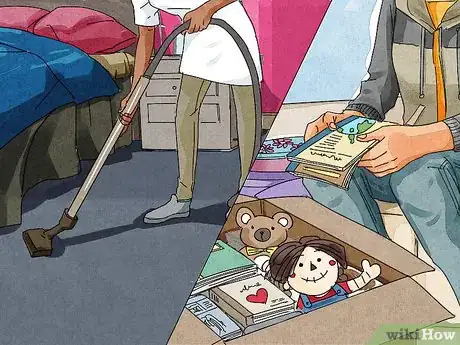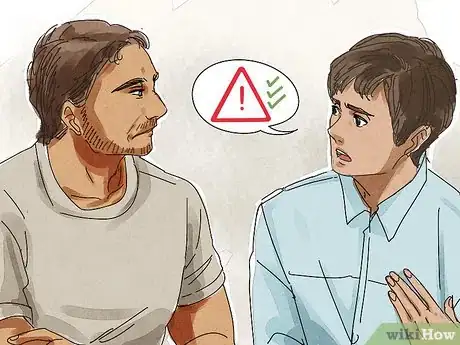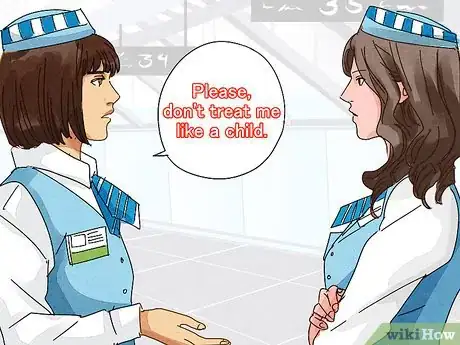This article was co-authored by César de León, M.Ed.. César de León is an Educational Leadership Consultant and currently serves as an Assistant Principal for the Austin Independent School District in Austin, TX. César specializes in education program development, curriculum improvement, student mentorship, social justice, equity leadership, and family and community engagement. He is passionate about eradicating inequities in schools for all children, especially those who have been historically underserved and marginalized. César holds a Bachelor’s degree in Education and Biology from Texas State University and a Master’s degree in Educational Leadership from The University of Texas at Austin.
There are 9 references cited in this article, which can be found at the bottom of the page.
This article has been viewed 57,506 times.
When you’re trying to grow up, make adult decisions, and act more mature, it can be really hurtful when other people let you know they still consider you just a child. The most important thing to do is stay calm. If you react emotionally, the person who already considers you to still be a child may think you’re proving them right. Instead, learn to interact with others like an adult, speak intelligently, and always try to look like an adult. You should also keep in mind that being an adult isn’t always all it’s cracked up to be, and there’s nothing wrong with being a child.
Steps
Interacting with Others Maturely
-
1Examine other people’s motivations. When somebody calls you a child, think about why they said it. Is it your physical appearance? Did you do something that would cause them to say it? Knowing why people perceive you as a child can help you work on looking and acting more mature.[1] If you can't identify a reason, ask the person politely why they called you a child.
- Don't get angry with them. Tell them that you are trying to act more grown up, and ask for advice. Say something like, “I know I’m younger than you are, but I’m trying to be more responsible and mature. Can you tell me why you still consider me a child?”
- If you think you do know why someone called you a child, ask them to verify this. You may have assumed the wrong thing. Say something like, “Do you still consider me a child because of my age/appearance/way of talking?”
- The person who thinks of you as a child may not be willing or able to offer you an explanation. Don’t let this bother you. Keep acting mature, and eventually, these people will see that you aren’t a child.[2]
- The motivation for calling you a child may not have anything to do with you personally. They could be jealous, insecure, or want to hurt your feelings for other reasons.
-
2Keep your cool. Don't yell, cry, or otherwise react emotionally to someone calling you a child. This will make you look even more like a child to them. If you are mad, walk away, or if you think you can do so calmly, explain to them what bothered you. Think about whether it is worth potentially having an argument. In most cases, the best way to prove the person who considers you a child wrong is to not let their behavior bother you.[3]
- Tears cannot always be helped. If you feel them coming on, excuse yourself. Step outside or to a quiet place to compose yourself. If you cannot walk away because you are at work or school, take some deep breaths. Try to change the subject. If you're still upset later, you can revisit the issue with the other person when you are feeling calmer.
Advertisement -
3Convince your family you’re not a child. Possibly the most difficult people to prove your maturity to are those who see you on a daily basis. Your parents, siblings, and other family members may have known you your entire life, and it’s often just as difficult for them to start considering you as an adult as it is for you to accept them treating you like a child. That’s no reason to give up on acting more mature. Eventually, even your closest family members will see you as an adult.
- Your parents may be the most difficult to convince you’re growing up. To them, you’ll always be their child, but your parents likely want you to be happy and more mature. Let them know how you feel about being called a child. Say something like, “I want to start acting more like an adult. It hurts my feelings when you call me a child. What can I do to make you think of me as an adult?”
- Older brothers or sisters may also see you as still being just a child, and it can be difficult to get away from them since you’ll likely see them every day. This makes it even more important for you to remain calm. The best way to convince older brothers and sisters you’re not a child is to ignore them when they call you one. Don’t argue with your siblings about being a grown up. Just keep acting like one. They’ll come around.[4]
- You can give evidence of why you think you are no longer a child. This can help convince your family to change their view of you. For example, you might say, "I have a job and pay all of my own bills and rent. I think that means I should be considered an adult now."
-
4Take on new responsibilities. Start by making sure you’re being responsible with all of your current activities.[5] Don't forget to do your homework. If you're in a play, don't forget your script. Remember your clothes for dance lessons after class. If you’re already keeping up with all of your current responsibilities, consider taking on some additional responsibilities to show people you’re not just a child. This can include volunteering for a leadership position in a club or organization you belong to, doing more to help around the house, or getting a part-time job.
- Don’t over extend yourself. Take on one new responsibility at a time, and once you’re sure you have it under control, you can consider other new responsibilities.
- Choose new responsibilities that you care about. It will make the added work easier. For instance, if you enjoy theatre, volunteer to work as a stage manager. You may want to select responsibilities that contribute towards long-term goals. For instance, volunteer or find an internship in your field or industry.
- Do whatever you can to not only complete your new responsibilities, but to go above and beyond to show you are committed. For example, if you need an event plan for a club you’re in charge of in place by next Friday, get it done this Friday.[6]
-
5Treat others with respect. Even if you feel disrespected, treat other people with kindness and understanding. It may not always be easy when people are treating you like a child, but showing others respect, even when it’s unearned, is an important part of being an adult.[7] Treating others with respect can be as simple as remembering not to demand or expect things from other people. Instead, ask for them, and say thank you.
- Start small. Say please and thank you. These are two of the easiest ways to show your respect for others. Say things like, “Please pass the salt,” instead of, “pass the salt.” By adding please, you are asking instead of demanding. Always say thank you, if someone responds to your request.
- Recognize other people are busy by saying something like, “I know you have a lot going on right now, but I would like to see a movie this weekend and could use a ride.” To express your gratitude, you can offer to do something in return.
- Say, “I’m sorry,” if you upset someone. Don’t get defensive and argue. Instead, say, “I’m sorry I upset you. I didn’t mean to.”[8]
-
6React with maturity. For example, when you get a present you hate, don't make it obvious. Say thank you and put it aside. Keep it simple. If you get an ugly sweater for your birthday, say, "Oh thank you, it looks really warm." That's all. Don’t go on about how you can’t wait to wear it, as this may come back to haunt you when you have to wear the sweater every time you see the gift giver. If you receive a grade you’re not happy with, don’t storm straight up to your teacher’s desk and demand a better grade. Instead, take at least 24 hours, review any notes your teacher made, and calmly ask your teacher, “I was really surprised by my grade. Can we talk about it, so I can do better next time?”[9]
-
7Set goals for yourself. One thing that many adults do that young people don’t is consider where they will be in a year, five years, ten years, etc. Consider long term goals and set achievable tasks that help you get there. This will show people in your life that you are serious about being more mature and making more adult decisions. Start small and build your way up to more advanced or long term life goals. Make a list of things you can accomplish in a day, a week, a month, etc., and keep track of your progress.
- If you always procrastinate your assignments in class until the last minute, set a goal to finish your task a week early. Create calendar reminders or ask a friend or family member to hold you accountable.
- If you want to attend a specific college, start finding out as much as you can about the college right away. Look up their application requirements, talk to a guidance counselor, and set up interviews at the school.[10]
- Share your progress and accomplishments with family and friends along the way. This can help boost your confidence and motivation. It can also help others respect you more, which may help them see you as an adult. When sharing these accomplishments, try not to brag.
-
8Consider volunteering your time. Sometimes, working with others to achieve a goal or improve your community will help you better understand what you need to do to improve as an individual. This may seem strange, but getting outside of your own head and seeing the big picture is a great way to think and act more like an adult.[11]
- If you are unable to volunteer for a charity or institution, you can make a difference by offering to help someone in your life. Try to give advice regarding things you have expertise, experience, or wisdom in.
Speaking and Looking Like an Adult
-
1Develop a more advanced vocabulary. Avoid using a lot of slang terms or talking about things that may be considered childish. A great way to appear more mature is to expand your vocabulary. You can try things like getting a word of the day calendar, or simply challenging yourself to learn and use a new word everyday. However, the best way to improve your vocabulary may be reading more good books.[12]
-
2Write properly. When communicating in writing, use real words and full sentences instead of slang or IM and SMS shorthand. This looks much better to those who might read your work. If you’re sending a text message to one of your friends, you can probably still use shorthand, but if you’re texting or emailing a teacher or other adult, take the time to write out complete sentences and punctuate appropriately. If you’re writing a paper or other assignment for class, always use proper grammar, punctuation, and spelling.
- Read through any writing before sending or submitting your written communication.
- Ask a friend who makes good grades in English or who likes to read or write to review papers, assignments, or even emails that you want to sound mature.
- Work on your spelling, grammar, and punctuation. If you are really struggling in these areas, ask your parents about seeking a tutor to help you write properly.
-
3Read about current events. This will help you vary your knowledge, so you can talk to others about a number of interesting topics. Many young people only talk about themselves, and this leads others to assume they are childish. However, if you can speak intelligently about what’s happening in your community or around the world, other people will begin to consider you as being more mature.[13]
-
4Dress for success. Wearing clothes that are brightly colored, mismatched, or too casual can make you look like a kid. Choose a simpler look. Try a plain button up shirt and jeans or slacks instead of a t-shirt with a slogan on it. Wear clothes that are appropriate to your surroundings. For guys, wear a shirt and tie and nice pants, if you’re going to an event where you want to look your best. For gals, a nice skirt, dress, or pair of slacks and blouse will make you look more mature. Something as simple as tucking in your shirt can dramatically improve your overall appearance making you look neat and put together.[14]
- You do not need to spend a lot of money to dress well. What matters is that your clothes fit you well and that they convey pride in your appearance.
-
5Change your hair. For guys, a shorter hairstyle can make you look more mature. Consider cutting your hair, using different styling products, or otherwise creating a more adult hairstyle. For gals, ditch the pigtails, brightly colored hair clips, and other youthful styles. Instead, wear your hair down or held back in a simple ponytail or bun. Whatever change you make, choose something that makes you feel comfortable.
- Try to style your hair like your favorite celebrity or an adult in your life whom you respect.
- Next time you go get a haircut, ask your stylist to help you choose something more grown up. You can also ask them for styling tips you can use at home.[15]
-
6Redo your room. Make it clean and organized. If you have posters of Barney or High School Musical up, take them down or put them inside a closet or somewhere less obvious. If you have children’s furniture, ask about getting new things or save up your money to buy new furnishings. Sometimes, simply changing your bedding can make your room look more adult. Instead of having cartoon themed or brightly colored sheets and blankets, switch to a solid color.[16]
- Declutter your home as much as possible. Donate books, clothing, and other items that you no longer use or need. The less you own, the easier it will be to keep your room tidy.
Getting Treated Like an Adult as an Adult
-
1Address concerns with family. For many adults, issues of being treated like a kid start in the home. It's not easy to remind your parents, siblings, and other family members that you are no longer a child. If your family makes you feel like you're still a kid, ask to talk to them about your concerns. Discuss the issue in private, and ask your family members to take the problem seriously.
- Say something like, "I'm 30 years old. I have a steady job, and I maintain my own home. It really hurts my feelings when you treat me like I'm a child."
- If you've talked to your family in the past and they repeat their belittling behavior, remind them respectfully by saying something like, "That is one of the hurtful comments I mentioned last time I was here."
- In some cases, convincing your family to treat you like an adult may be a losing battle, at any age. Continue to act like an adult, and hopefully, they'll come around.[17]
- Often, it will take a series of repeated gentle conversations to get the point across. Try to redirect the conversation when it happens. Do not expect the issue to be fixed overnight.
-
2Talk to your coworkers or peers. If you're being treated like a child in the workplace, you need to address the issue right away. This lack of respect may not seem like a problem at first, but you're much more likely to be overlooked when it comes time for promotions, leading a big project, or other responsibilities if coworkers see you as just a child. This is especially true if you allow them to treat you this way.
- If a coworker is calling you a child or treating you like a child, ask to talk to them. Say something like, "I've worked really hard to get where I am, and I don't appreciate it when you call me a child. What can I do to improve your view of me?
- If a supervisor or boss is treating you like a child. Start by requesting a meeting. Ask your boss, "Why do you call me a child? Is there something I can do to change your view of me?"
- It's important for your supervisors to treat you like an adult, so if they are unable or unwilling to work with you, you may need to reach out to human resources or your boss' boss.[18]
-
3Make unselfish decisions. As an adult, one of the easiest ways to show others your maturity is to consider the big picture when making choices. As an example, if you want to change jobs, take the time to consider the long term ramifications of your actions. Don't just quit your current job and hope a new one works out. Additionally, think through how your choice to change jobs will effect your family, your coworkers, and your business.[19]
Expert Q&A
-
QuestionWhat can I do to act more mature?
 César de León, M.Ed.César de León is an Educational Leadership Consultant and currently serves as an Assistant Principal for the Austin Independent School District in Austin, TX. César specializes in education program development, curriculum improvement, student mentorship, social justice, equity leadership, and family and community engagement. He is passionate about eradicating inequities in schools for all children, especially those who have been historically underserved and marginalized. César holds a Bachelor’s degree in Education and Biology from Texas State University and a Master’s degree in Educational Leadership from The University of Texas at Austin.
César de León, M.Ed.César de León is an Educational Leadership Consultant and currently serves as an Assistant Principal for the Austin Independent School District in Austin, TX. César specializes in education program development, curriculum improvement, student mentorship, social justice, equity leadership, and family and community engagement. He is passionate about eradicating inequities in schools for all children, especially those who have been historically underserved and marginalized. César holds a Bachelor’s degree in Education and Biology from Texas State University and a Master’s degree in Educational Leadership from The University of Texas at Austin.
Educational Leadership Consultant You seem a lot more mature when you prepare for things ahead of time and keep your emotions in check.
You seem a lot more mature when you prepare for things ahead of time and keep your emotions in check.
Warnings
- Don't be in such a hurry to be grownup. Childhood only comes once in a lifetime. Enjoy it while you can.⧼thumbs_response⧽
- Don't pretend to be someone that you aren't, doing that will cause unhappiness and confusion.⧼thumbs_response⧽
References
- ↑ César de León, M.Ed.. Educational Leadership Consultant. Expert Interview. 11 November 2020.
- ↑ http://www.rogerkallen.com/how-to-become-emotionally-mature/
- ↑ https://www.psychologytoday.com/blog/the-human-experience/201308/how-become-more-adult-and-successful-in-your-life
- ↑ http://blogs.psychcentral.com/addiction-recovery/2014/06/stuck-in-adolescence-helping-your-young-adult-act-like-one/
- ↑ César de León, M.Ed.. Educational Leadership Consultant. Expert Interview. 11 November 2020.
- ↑ http://www.rogerkallen.com/how-to-become-emotionally-mature/
- ↑ César de León, M.Ed.. Educational Leadership Consultant. Expert Interview. 11 November 2020.
- ↑ https://www.psychologytoday.com/blog/the-human-experience/201308/how-become-more-adult-and-successful-in-your-life
- ↑ http://www.rogerkallen.com/how-to-become-emotionally-mature/
- ↑ https://www.psychologytoday.com/blog/the-human-experience/201308/how-become-more-adult-and-successful-in-your-life
- ↑ https://www.psychologytoday.com/blog/the-human-experience/201308/how-become-more-adult-and-successful-in-your-life
- ↑ https://www.helpguide.org/articles/relationships/effective-communication.htm
- ↑ https://www.entrepreneur.com/article/234965
- ↑ http://www.whowhatwear.com/sophisticated-grownup-style/slide8
- ↑ http://www.prevention.com/beauty/aging-hairstyles
- ↑ http://homeguides.sfgate.com/make-room-grownup-52879.html
- ↑ http://blogs.psychcentral.com/addiction-recovery/2014/06/stuck-in-adolescence-helping-your-young-adult-act-like-one/
- ↑ https://www.psychologytoday.com/blog/the-human-experience/201308/how-become-more-adult-and-successful-in-your-life
- ↑ https://www.psychologytoday.com/blog/the-human-experience/201308/how-become-more-adult-and-successful-in-your-life


